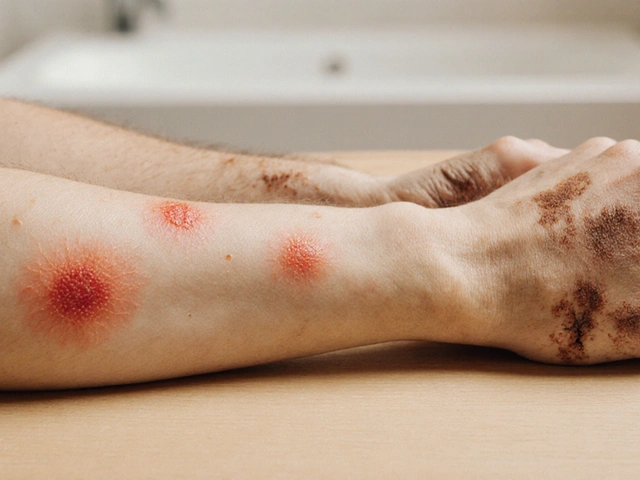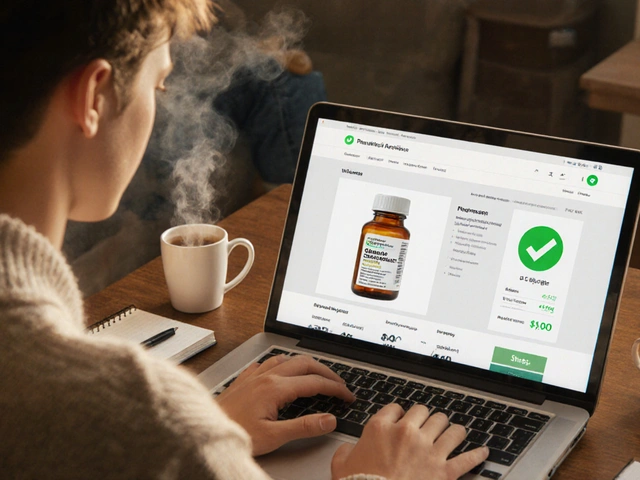Probiotic Timing Calculator
Probiotic Timing Calculator
Calculate when to take probiotics to maximize effectiveness and avoid killing beneficial bacteria with antibiotics. Follow the 2-hour rule recommended by medical experts.
Recommended Probiotic Timing
When you’re on antibiotics, your gut knows it. You might feel bloated, gassy, or worse - hit with watery diarrhea. It’s not just bad luck. Antibiotics don’t just kill the bad bacteria; they wipe out the good ones too. And that’s where probiotics come in. But here’s the twist: when you take them matters just as much as if you take them.
Why Your Gut Gets Disrupted by Antibiotics
Antibiotics are powerful. They’re designed to destroy bacteria causing infections. But your gut is home to trillions of bacteria - mostly helpful - that help digest food, make vitamins, and keep your immune system in check. When antibiotics sweep through, they don’t pick and choose. They kill indiscriminately. Studies show this disruption can last up to two years in some people, even after the course is done.The result? A gut microbiome that’s out of balance. This imbalance is the main reason why 20-30% of people on antibiotics end up with antibiotic-associated diarrhea (AAD). For some, it’s mild. For others, it’s debilitating enough to stop the treatment.
Probiotics: Helpers or Hijackers?
Probiotics are live bacteria or yeasts that can help restore balance. The most studied strains for antibiotic-related issues are Lactobacillus rhamnosus GG and Saccharomyces boulardii. These aren’t magic pills, but they’ve been shown in multiple studies to reduce the risk of AAD by nearly half.But here’s where things get messy. A 2023 UCLA Health review pointed out something alarming: taking probiotics while on antibiotics might actually slow down your gut’s natural recovery. One 2018 study in Nature Microbiology found that people who took probiotics after antibiotics took 132 days longer to get their original gut bacteria back compared to those who didn’t take anything.
So are probiotics helping or holding you back? The answer isn’t simple. Some research shows they reduce diarrhea. Other research shows they delay recovery. The truth? It depends on the strain, the timing, and your body.
Timing Matters: The 2-Hour Rule
If you’re going to take probiotics with antibiotics, spacing them out is non-negotiable. Antibiotics don’t discriminate - they’ll kill probiotics on contact. That’s why Harvard Medical School and the American Gastroenterological Association both recommend taking probiotics at least 2 hours before or after your antibiotic dose.Why 2 hours? It’s enough time for the antibiotic to be absorbed and start working, without lingering in your gut long enough to wipe out the probiotics. A 2024 study in Frontiers in Microbiomes found that when probiotics were taken 2 hours after antibiotics, they survived better and helped reduce antibiotic resistance genes in the gut - something antibiotics alone can’t do.
Most people who’ve tried it report taking probiotics either right after breakfast (2 hours after their morning antibiotic) or right before bed. Bedtime works well for those who take antibiotics in the morning - it gives the probiotics a quiet window to settle in without interference.

Which Strains Actually Work?
Not all probiotics are created equal. Out of hundreds of commercial products, only a handful have solid evidence for helping with antibiotic side effects.- Lactobacillus rhamnosus GG - Proven to reduce AAD by 26% compared to multi-strain blends in a 2022 Cochrane review.
- Saccharomyces boulardii - A yeast, not a bacteria, so it’s not killed by antibiotics. Shown to prevent diarrhea in 14-day antibiotic courses.
- Lactobacillus plantarum 299v - Less common but showed 37% better microbiome preservation in a 2023 ISAPP study when taken 2 hours after antibiotics.
Multi-strain products sound better, but they’re not always more effective. Stick to single-strain products with proven results. And check the label: if it says "refrigerated," keep it cold. Shelf-stable probiotics lose up to 20% of their potency after 30 days at room temperature.
Dosage: More Isn’t Always Better
You’ll see probiotics advertised with 50 billion, 100 billion, even 200 billion CFUs (colony-forming units). But you don’t need that much. For most people, 5-10 billion CFU daily is enough. For those with weak immune systems, or on strong antibiotics like clindamycin or vancomycin, 20-40 billion CFU may be recommended - but only under a doctor’s guidance.Why? High doses can cause bloating, gas, or even temporary diarrhea. That’s not a sign they’re working - it’s your gut adjusting. Some probiotics produce gas as a byproduct. It’s normal for the first few days, but if it lasts longer than a week, you might be taking too much - or the wrong strain.
How Long Should You Keep Taking Them?
Don’t stop when the antibiotics run out. Your gut needs time to rebuild. Experts recommend continuing probiotics for at least 1-2 weeks after your last antibiotic dose. For broad-spectrum antibiotics - the kind that hit a wide range of bacteria - go for 3-4 weeks.A 2024 study followed participants for 28 days after antibiotics ended. Those who kept taking probiotics saw a continued drop in antibiotic resistance genes. Those who stopped? Their resistance levels crept back up.

What About Food vs. Supplements?
Yogurt, kefir, sauerkraut, kimchi - these are natural sources of probiotics. But here’s the catch: they don’t contain the same concentrated, targeted strains as supplements. A serving of yogurt might have 1 billion CFU - not enough to make a big difference during antibiotic treatment.Food is great for long-term gut health. But if you’re trying to prevent diarrhea or protect your microbiome during a course of antibiotics, supplements are more reliable. You know exactly what you’re getting. With food, the strain, quantity, and viability vary wildly.
Who Should Avoid Probiotics?
Most people can take probiotics safely. But if you’re immunocompromised - due to cancer treatment, organ transplants, HIV, or severe autoimmune disease - you’re at risk for rare but serious infections from live bacteria.There have been documented cases of probiotic strains entering the bloodstream in vulnerable patients, leading to sepsis. The CDC and FDA both warn about this. If you’re unsure, talk to your doctor before starting.
Also, avoid probiotics if you’ve had recent surgery, especially intestinal surgery, or if you have a central venous catheter. These are high-risk situations where even harmless bacteria can become dangerous.
The Bottom Line: What to Do
If you’re on antibiotics and want to reduce side effects, here’s your simple plan:- Choose a single-strain probiotic with proven results: L. rhamnosus GG or S. boulardii.
- Take it 2 hours after your antibiotic dose - not at the same time.
- Use 5-10 billion CFU daily (20-40 billion if your doctor recommends it).
- Keep taking it for 1-2 weeks after your antibiotics end.
- Store refrigerated strains in the fridge. Don’t leave them on the counter.
- Stop if you get worsening bloating, pain, or fever - and call your doctor.
Probiotics aren’t a cure-all. They won’t fix everything. But for many, they’re the difference between finishing your antibiotics with just a stomachache - or being sidelined by diarrhea for days.
The science isn’t perfect. But the evidence is strong enough that 73% of U.S. doctors now recommend them. And with 87% of gastroenterologists expecting clearer guidelines in the next five years, this isn’t going away.
Listen to your body. If you feel better, keep going. If you feel worse, stop. And always talk to your doctor - especially if you’re on multiple medications or have a chronic condition.
Can I take probiotics at the same time as antibiotics?
No. Taking them together means the antibiotic will kill the probiotic bacteria before they can help. Always wait at least 2 hours after taking your antibiotic before taking your probiotic. Some people prefer to take probiotics right before bed, especially if they take antibiotics in the morning.
Which probiotic strain is best for antibiotic side effects?
Lactobacillus rhamnosus GG and Saccharomyces boulardii have the strongest evidence for reducing antibiotic-associated diarrhea. Lactobacillus plantarum 299v also shows promise. Avoid multi-strain products unless they specifically include one of these strains - they’re often less effective and more expensive.
How long should I take probiotics after finishing antibiotics?
Continue for at least 1-2 weeks after your last antibiotic dose. For broad-spectrum antibiotics like clindamycin or ciprofloxacin, extend it to 3-4 weeks. This gives your gut time to rebuild without being overwhelmed by antibiotic-resistant bacteria or lingering inflammation.
Do I need to refrigerate my probiotics?
If the label says "refrigerate," then yes. Refrigerated probiotics maintain 85-90% viability after 30 days. Shelf-stable versions lose up to 20% potency at room temperature. Even if your probiotic doesn’t require refrigeration, storing it in the fridge can help extend its life.
Can probiotics cause side effects?
Yes - but usually mild. Bloating, gas, and temporary diarrhea are common in the first few days as your gut adjusts. If symptoms last longer than a week, you may be taking too high a dose or the wrong strain. Stop and consult your doctor. Rarely, probiotics can cause serious infections in people with weakened immune systems.
Are probiotics safe for children and seniors?
Generally yes. Probiotics are considered safe for most children and older adults. However, seniors with chronic illnesses or weakened immunity should check with their doctor first. For children, use age-appropriate doses - typically 5-10 billion CFU. Always choose products labeled for pediatric use.
Can I get enough probiotics from food instead of supplements?
Fermented foods like yogurt, kefir, and sauerkraut are great for long-term gut health, but they don’t contain enough concentrated, targeted strains to reliably prevent antibiotic diarrhea. Supplements offer precise dosing and proven strains. Use food for maintenance, supplements for acute support during antibiotic treatment.
Will probiotics interfere with my other medications?
Probiotics rarely interfere with other medications. But if you’re on immunosuppressants, antifungals, or have a central line or recent surgery, talk to your doctor. Also, avoid probiotics if you’re allergic to yeast - Saccharomyces boulardii is a yeast, not a bacteria.






Okay but let’s be real-why are we even talking about probiotics like they’re some kind of miracle cure? 🤦♀️ I took amoxicillin last year and just ate yogurt every day. No supplements. No drama. My gut was fine. This whole industry is just selling fear wrapped in fancy labels.
It’s fascinating how we’ve reduced the intricate, co-evolved symbiosis of the human microbiome to a binary choice: ‘take this pill or suffer.’ The reductionist logic of modern medicine ignores the epigenetic and ecological dimensions of microbial resilience. We’re not just hosts-we’re ecosystems. And yet, we treat our guts like a broken toaster you fix with a single part. 🤖💩
Moreover, the notion that a 2-hour window is sufficient to ‘protect’ probiotics from antibiotics is laughably naive. Antibiotics persist in the gut lumen for hours-sometimes days. The real issue isn’t timing-it’s the fundamental incompatibility of introducing exogenous strains into a system already in crisis. We’re not restoring balance; we’re adding noise to a signal already drowning.
And let’s not forget: the ‘proven’ strains? Most studies are industry-funded. L. rhamnosus GG? A trademarked strain owned by a corporation that also sells the supplements. Conflict of interest much?
Meanwhile, the gut’s native microbiota, honed over millennia, are being erased by broad-spectrum antibiotics-and we’re expected to believe that a $25 bottle of freeze-dried bacteria from a warehouse in Idaho can fix it? Please.
The real solution? Fecal microbiota transplantation. Or at least, eating fermented foods from diverse, traditional cultures. Not this capitalist placebo parade.
Also, ‘refrigerated’ probiotics? That’s just a marketing tactic. Most shelf-stable ones are lyophilized and just as viable. The fridge thing? It’s to make you feel like you’re doing something ‘scientific.’ You’re not. You’re just buying into a wellness cult.
And don’t even get me started on S. boulardii. A yeast. Not even a bacterium. So technically, it’s not a probiotic at all-it’s an antifungal agent masquerading as a ‘gut healer.’
Probiotics are not medicine. They’re the pharmaceutical industry’s answer to ‘I don’t want to feel bad while my body heals itself.’
TL;DR: Stop buying into the microbiome industrial complex. Eat real food. Sleep. Reduce stress. Your gut doesn’t need a supplement. It needs peace.
YESSSSS! I was so scared to take probiotics with my antibiotics last time, but I did it like they said-2 hours apart-and I didn’t get one single stomach ache! 🎉 I took the L. rhamnosus one from the drugstore, kept it in the fridge like a baby, and boom-no more bloating! You guys, it’s not magic, it’s just science that works! 😭💖
I took probiotics with my antibiotics and ended up in the ER. They said I had sepsis. I didn’t even know probiotics could do that. Now I’m on life support. Thanks, internet.
Wow. So you’re telling me that after 20 years of doctors telling us antibiotics are harmless and probiotics are ‘fluffy nonsense,’ now suddenly they’re recommending them? And you’re all acting like this is some groundbreaking revelation? 😂
Let me guess-this article was written by a supplement company’s marketing intern. The ‘2-hour rule’? Been around since 2010. The strains? All listed in the Cochrane reviews from 2018. The ‘87% of gastroenterologists expect clearer guidelines’? That’s not a statistic-that’s a PR quote pulled from a press release.
And don’t even get me started on ‘shelf-stable probiotics lose 20% potency.’ So? You’re still getting 80%. That’s more than your last Tinder date gave you.
Also-‘avoid if immunocompromised’? Duh. That’s like saying ‘don’t jump off a cliff if you can’t fly.’
This article is just fear + placebo + capitalism dressed up as science. I’m not impressed.
Who let this nonsense into America? We used to just take antibiotics and tough it out. Now we’re giving our kids $40 bottles of bacteria like it’s some kind of vitamin? This is why our country’s going down the drain-overpriced supplements for everything. If you can’t handle a little diarrhea, maybe you shouldn’t be on antibiotics in the first place. Get tough. We didn’t have probiotics in 1980 and we survived. Now we’re all walking around like we’re made of glass.
Hey everyone-just wanted to say THANK YOU for this post. I was so nervous about starting my antibiotics, but now I feel SO much more confident. I’m taking my probiotic right before bed, like you said, and I’ve already noticed less bloating. 🙏 I’m 72 and I’ve never felt this good during a course of meds. You’re a lifesaver. Keep sharing this kind of stuff. We need more people like you in the world. 💪❤️
As someone who’s worked in public health for 20 years, I’ve seen this play out over and over. People panic about antibiotics, then rush to buy probiotics without knowing what they’re taking. This post? It’s the best summary I’ve seen in years. Simple. Clear. Evidence-based. No hype. Just facts.
And yes-refrigeration matters. I’ve seen people leave their probiotics in their car in July. The bacteria are dead before they even open the bottle. It’s heartbreaking.
Also-food vs. supplements? Totally right. Kimchi is great for daily gut health, but when you’re on clindamycin? You need the dose. 10 billion CFU is enough for most. No need to go crazy.
To the person who went to the ER-so sorry you had that experience. That’s why we always say: if you’re immunocompromised, talk to your doctor first. Probiotics aren’t dangerous for most-but they’re not risk-free. We need to stop treating them like candy.
And to the guy who said we didn’t need them in 1980? We also didn’t have access to clean water, vaccines, or antibiotics back then. Progress isn’t about going backward. It’s about using science to make things better. This isn’t ‘wellness nonsense.’ It’s medicine that’s finally catching up to the microbiome.
Keep listening to your body. And keep asking questions. That’s how we learn.